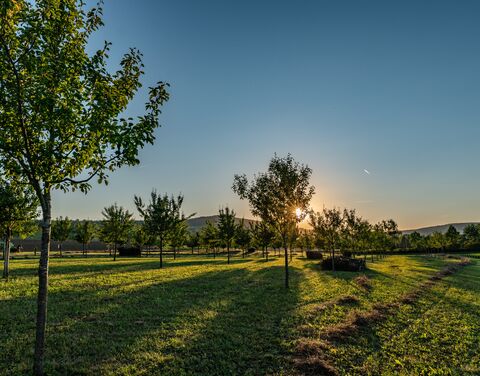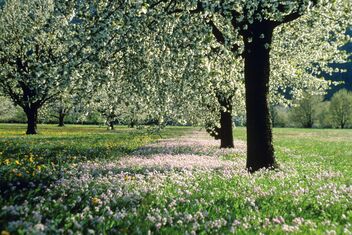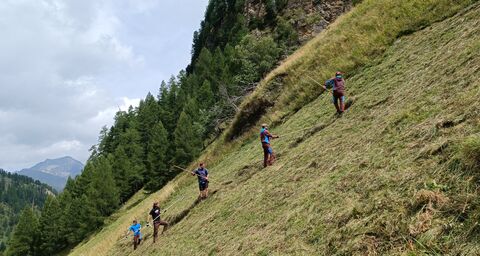
Homes are to be created for rare wild bee species on Im Hecht organic farm
Im Hecht farm in Niederhasli in the canton of Zurich has been organic for over 20 years. Rare types of wild bees have also been discovered on the farm. As part of our anniversary celebration, AXA Switzerland is sponsoring a biodiversity project in the standard fruit tree orchard of this organic farm that will serve to establish colonies of wild bees and insects.
Promoting biodiversity in a standard fruit tree orchard
Michel Marty, manager of Im Hecht organic farm, operates his farm using the principles of regenerative agriculture. His focus is on regenerating the soil and on biodiversity. Together with oekoskop (in German), he is implementing a biodiversity project in his standard fruit tree orchard. Sponsored by AXA Switzerland, this project aims to establish colonies of wild bees and insects.
Wild bees
In Switzerland, there are over 600 types of wild bees. The importance of their role as pollinators has long been underestimated. They are especially useful at significantly increasing the fruit set of standard fruit trees. Certain wild bees, such as bumblebees, even fly during bad weather, and some are much more efficient at pollinating fruit than honeybees.
Planned measures
Structures and blooming meadows provide shelter and nesting materials for insects as well as food for wild bees. This is why the following measures are planned for this project:
- Creation of structures such as sand structures, deadwood and cleared slopes which will provide spaces for nesting, hiding and overwintering for many species. Around three quarters of native bee species nest in the ground. Some of them bore holes into rotten wood to lay their eggs, and others make their nests in the hollows of deadwood.
- Creating blooming meadows is an important way to promote species diversity and various habitats in the cultivated landscape. Pockets of blooming flowers provide both a quick source of cut flowers and also valuable habitat for insects and wild bees for years to come.

Why are fields of flowers so important to wild bees?
Since many types of wild bees collect only the pollen of certain flowers, which they use to feed their young, it’s important to have a wide range of different blooming plants. And the amount of flowers that wild bees need to raise their young can be incredibly high. A viper’s bugloss bee, for instance, needs the pollen of about 140 individual flowers from the viper’s bugloss plant (Echium vulgare) to feed a single bee larvae. But wild bees are not the only ones to benefit from fields of flowers – other beneficial insects use them as a food source as well. A large number of insects feed on nectar and pollen, such as hoverflies, lacewings and even the tiny Darwin wasp. The larvae of these insects help farmers by feeding on aphids, mites and other pests, protecting the fruit trees from pest infestations.
Your contribution to the project
You can support the standard fruit tree orchard project at Im Hecht organic farm and help establish rare wild bee colonies in the area surrounding Zurich. This way you’ll be making a key contribution to promoting species and habitat diversity in Switzerland.
As an AXA customer, you have the option of taking part in this project or any of our other anniversary projects. Come join us in the Flora Futura Box, where you’ll be able to scan the QR code on the invitation you received. For every QR code that is scanned, AXA will donate CHF 5 to the biodiversity project in your region.





